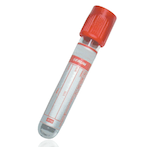Suitable Specimen Types
- Serum
Specimen Transport
Serum must be transported to referral laboratory frozen.Sample Processing in Laboratory
On ice to laboratory immediately. Separate within 30 mins of collection in a cooled centrifuge. Freeze the serum and transport to SAS centre frozen.Sample Preparation
Collect blood into a plain (red top) vacutainer placed on ice. Transport to lab on ice immediately. Separate within 30 mins of collection in a cooled centrifuge.Turnaround Time
7 days - assayed 3 times /weekSample Stability
-20 ºCCalcitonin
General Information
Calcitonin is a peptide hormone secreted by the parafollicular C-cells of the thyroid under calcium control. Its precise physiological function is poorly understood.
The main use of serum calcitonin is in the diagnosis and monitoring of medullary carcinoma of the thyroid. In those cases which are of familial origin (MEN II), serum calcitonin can also be used as a screening test in the relatives of known cases.
Inappropriate secretion of calcitonin may also be seen in a variety of other neoplasms, including small cell carcinoma of lung, breast carcinoma, renal tubular carcinoma and carcinoid tumours.
Moderate increases may be seen in pregnancy, renal failure and pernicious anaemia.
Patient Preparation
Fasting samples are recommended by referral laboratory (Medical Oncology, Charing Cross) however samples will still be analysed if the patient is not fasted.
Notes
Tests which attempt to stimulate the levels of calcitonin are more sensitive than calcitonin measurements alone. These tests involve collecting a sample before stimulation, then giving the patient an injection of intravenous calcium and/or pentagastrin to stimulate calcitonin production. Several more blood samples are then collected over the next few minutes to gauge the effect of the stimulation. Patients with early C-cell hyperplasia and/or MTC will usually have very significant increases in their levels of calcitonin during this test.
Stimulation tests may also be used when a patient has indeterminate or normal calcitonin results but clinical suspicions remain.
Reference Range
Females <5.5 ng/L
Males < 18.9 ng/L
(New reference range July 2006 - Diasorin assay)
Specifications
- EQA Status: No details
